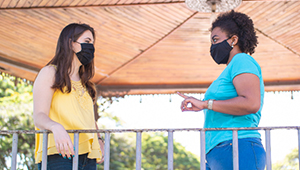KPWHRI to launch study on vaccine hesitancy among long-term care workers

KPWHRI Assistant Investigator Clarissa Hsu, PhD, will lead the new study.
The Patient-Centered Outcomes Research Institute plans to award $4.75 million to compare ways to raise COVID-19 immunization rates
A research team at Kaiser Permanente Washington Health Research Institute (KPWHRI) has been approved for a $4.75 million funding award by the Patient-Centered Outcomes Research Institute (PCORI) to study what types of communication and community engagement strategies are most effective at improving uptake of COVID-19 vaccines among workers in long-term care facilities (LTCFs) for older adults and other vulnerable populations.
Called the ENSPIRE Study, the new research project aims to generate evidence that could help raise immunization rates among LTCF workers — a group including populations that generally have experienced more severe illness and death due to COVID-19. These workers are in frequent direct contact with older adults, who, if unvaccinated, face a high risk for becoming severely sick or dying if exposed to the novel coronavirus.
KPWHRI will work in collaboration with Kaiser Permanente of Georgia, University of Washington and the Global Alliance to Prevent Prematurity and Stillbirth (GAPPS) affiliated scientists, along with co-investigators with experience working in long-term care facilities. The study will also engage an advisory panel of governmental, industry and policy stakeholders.
“Community engagement and tailored communication strategies are important for addressing vaccine hesitancy, especially for communities such as immigrant/refugee and racial and ethnic groups that experience racism and discrimination in both research and health care,” said Clarissa Hsu, PhD, the KPWHRI assistant investigator who is leading the study. “While people in these communities often trust information and support from their social networks, community-engagement and tailored messaging strategies have yet to be tested to determine their effectiveness at increasing vaccine uptake or feasibility of systematic implementation.”
According to the project summary, the study will be carried out in Georgia and Washington state, with 60 LTCFs, 30 in each state. It will include about 6,000 frontline workers, with a particular focus on cultural or affinity groups that have high rates of hesitancy in order to increase health equity and inclusion. Each LTCF will be randomly assigned to 1 of 3 interventions:
- Enhanced usual care. These LTCFs will receive information about the COVID-19 vaccine from the CDC (Centers for Disease Control and Prevention), with 1 to 3 hours of help on how to give the information to their staff.
- Full intervention. Workers at these LTCFs will join with the study team to codesign materials with vaccine information. They will also find ways to give the information to other LTCF workers and learn to be peer advocates for the vaccine.
- Limited intervention. Materials created by the groups at the full intervention sites will be taken to LTCFs where the staff do not get enhanced usual care and do not go through the codesign process. Materials will be given to staff by LTCF leaders, who will receive 1 to 3 hours of help from the study team.
This study is 1 of 2 complementary studies that PCORI announced earlier this week as part of its initiative to assess approaches for increasing COVID-19 vaccine confidence among long-term care workers. This topic was identified as an urgent need following a November 2020 survey, which found that only 45% of long-term care workers were willing to receive a COVID-19 vaccine immediately once available. Evidence generated by these studies may offer useful insights for promoting greater confidence in immunization against other diseases as well.
“This study was selected for PCORI funding not only for its scientific merit and commitment to engaging patients and other stakeholders, but also for its potential to fill an important gap in our health knowledge,” said PCORI Executive Director Nakela L. Cook, MD, MPH. “The study addresses an urgent need as COVID-19 vaccination rates are slowing generally and long-term care workers and those they care for continue to face elevated risks from the novel coronavirus. We look forward to following the study’s progress and working with KPWHRI to share the results.”
This funding award has been approved pending completion of a business and programmatic review by PCORI staff and issuance of a formal award contract.
PCORI is an independent, nonprofit organization initially authorized by Congress in 2010. Its mission is to fund research that will provide patients, their caregivers and clinicians, and other health care decision makers with the evidence-based information needed to make better-informed health care choices.
Healthy Findings Blog

Vaccine hesitancy in the time of COVID-19
Can lessons from Immunity Community help build acceptance of COVID-19 vaccines? Clarissa Hsu, PhD, thinks so.
innovative health care

Co-designing health care with patients: A how-to guide
Dr. Clarissa Hsu writes about how her team equalized power between patients and staff in a quality improvement project.



